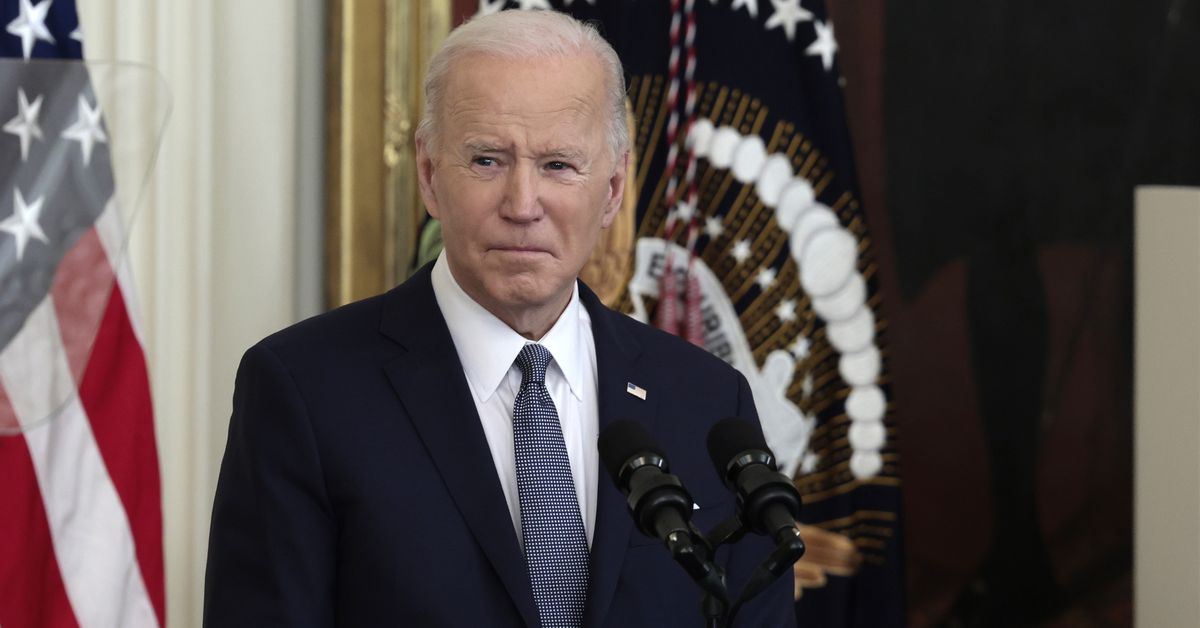On the eve of his State of the Union address, amid an international crisis, President Joe Biden has sunk to his worst approval numbers yet. A new
On the eve of his State of the Union address, amid an international crisis, President Joe Biden has sunk to his worst approval numbers yet.
A new Washington Post/ABC poll found just 37 percent of adults approve of Biden’s job performance. The poll was conducted partly before and partly after Russian President Vladimir Putin attacked Ukraine.
That’s just one sample, but Biden’s approval in FiveThirtyEight’s weighted average of polls has sunk to 40.7 percent, from around 42 percent before Russia attacked Ukraine — suggesting the foreign crisis has so far not spurred the American public to rally around Biden’s leadership. Instead, he has bottomed out as the crisis ramps up.
The stakes of the Russia-Ukraine war are much higher than Biden’s own political fortunes, of course, and he shouldn’t be making decisions about it based on his approval rating. But this is an ominous sign regarding the American public’s willingness to bear the costs of economic turmoil that the war and the resulting sanctions from the West may unleash.
It’s too much to expect any one speech to drastically change Biden’s political position, but it is one of the most high-profile chances he’ll get to put out a message to the public before November’s midterms. But to do so, he’ll have to strike a balance between the international crisis and Americans’ domestic worries.
A foreign crisis, and a public with domestic concerns
Though Biden has been praised by foreign policy elites for his response since Russia’s attack, the conflict likely still seems far off to many Americans, notable mainly for deepening the sense that the world is going to hell.
Instead, it’s the state of the economy that continues to most unsettle the public, with 75 percent of respondents to the Post/ABC poll rating the economy as either “not so good” or “poor.” Asked about their personal finances, 35 percent of respondents said they were worse off since Biden took office, 17 percent said they were better off, and 47 percent said they were doing about the same.
That perception is likely due to high inflation eating into real incomes. According to the Bureau of Economic Affairs, real incomes decreased by 0.5 percentage points in fourth quarter of 2021 compared to one year prior. And bad news on this metric is associated with a bad performance for the president’s party in midterm elections.
But Biden’s problems are broader than the economy. His approval rating rapidly dropped in August of last year, as headlines were dominated by chaos in Afghanistan while he was withdrawing US troops. The media then moved on from Afghanistan, but the bad news continued with the rise of new Covid variants, as well as inflation. By the fall, polls showed that about half of voters gave Biden low marks for “competence.” In a new Quinnipiac University poll conducted after Putin’s attack, just 39 percent of respondents approved of Biden’s response to Russia, with 47 percent disapproving.
So from Afghanistan to his legislative agenda to the economy to the coronavirus to now Russia’s invasion of Ukraine, the narrative has been the same: that Biden is floundering and ineffective. Some of those criticisms are unfair, others are defensible — but that’s the perception he really needs to change to have any hope of avoiding a midterm debacle.
What the State of the Union can, and can’t, do for Biden
Biden will get to make the case for his crisis response, and for his presidency in general, with his State of the Union address Tuesday. And though Ukraine has been dominating headlines and will clearly be a focus, much of the speech is still expected to focus on the economy and the administration’s efforts to fight inflation, Nancy Cook of Bloomberg News reported.
The speech itself is unlikely to affect his approval — Gallup’s Jeffrey Jones has written that these addresses “rarely affect a president’s public standing in a meaningful way, despite the amount of attention they receive.” But his best opportunity to make a memorable historical statement may lie in the realm of foreign policy. Certain addresses focused on international matters have stood the test of time, in ways both good and bad.
In 1823 James Monroe used his “president’s message” (as the State of the Union, then delivered in writing, was then called) to announce what became known as the Monroe Doctrine, which became a cornerstone of American foreign policy. In 1941 FDR listed “Four Freedoms” that the US pledged to defend all over the world, as war raged. And in 2002 George W. Bush asserted that North Korea, Iran, and Iraq comprised an “axis of evil,” setting the stage for the US invasion of Iraq. Each of these was remembered for putting forward a distinct idea or memorable turn of phrase.
If Biden wanted to speak and craft rhetoric for history rather than short-term popularity, he could try to do so. But he also may want to avoid trying to define a new foreign policy doctrine now, amid a tense unfolding crisis. His imperative is still two-sided — he wants to signal resolve in standing up against Putin’s aggression, but he also would very much like to make clear a path to deescalating the crisis is possible.
It’s a tough balance to strike, particularly with the perceived need in the speech to cover all the domestic concerns that worry Americans as well. And there are other topics on Biden’s mind as well — such as his new Supreme Court nominee and his hopes of reviving the stalled Build Back Better bill in some form. Modern State of the Union addresses usually attempt to cover practically everything on the political agenda, even though they risk sounding like a laundry list.
